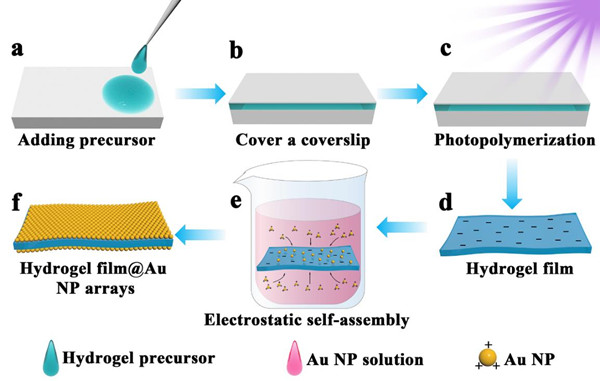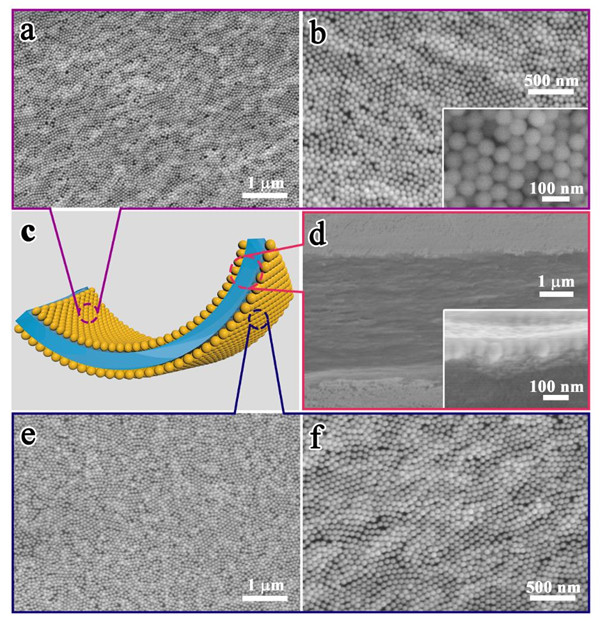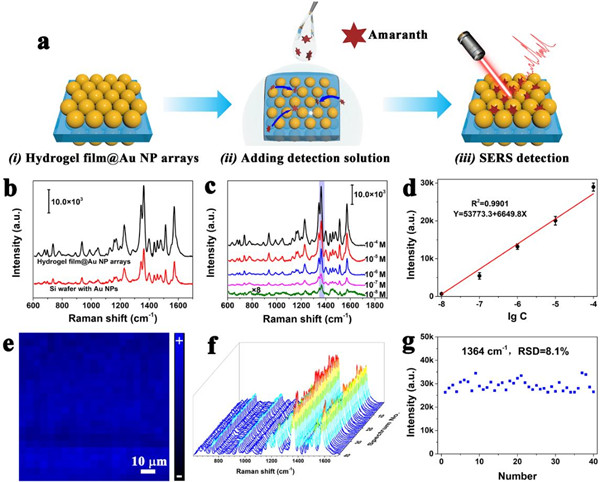
The ordered arrays of tightly expelled gold nanoparticles loaded on hydrogels has received much attention for the surface plasmon resonance effect. However, the method of loading construction is to synthesize the noble metal nano-array on the solid substrate, and then transfer to the hydrogel to form the composite film structure, which would cause defects in the transfer process.
Researchers from Institute of Solid State Physics, Hefei Institutes of Physical Science (HFIPS), Chinese Academy of Sciences, led by Prof. LI Yue, offered a simple and efficient strategy recently to construct precious metal nanoparticle arrays directly on hydrogels.
This facile self-assembly strategy is based on electrostatic adsorption and hydrogel shrinkage effect. It not only revealed the self-assembly mechanism driven by the principle of minimum free energy, but also solved the difficulty of non-close arrangement random assembly caused by the secondary electrostatic repulsion of adsorbed particles in the traditional electrostatic self-assembly technology. Besides, it realized the batch preparation of ordered arrays of dense gold nanoparticles loaded with large area hydrogel.
In this research, the ordered array of dense gold nanoparticles loaded on hydrogel films, which based on hydrogel shrinkage-assisted electrostatic self-assembly, was constructed by uniform gold nanospheres in a close arrangement of hexagons. The large area was ordered and uniform, and there were only a small number of vacancy defects caused by the absence of gold nanoparticles. This indicated that large area ordered and closely arranged gold nanoparticles arrays were successfully prepared on both sides of the hydrogel film by the combination of electrostatic self-assembly and hydrogel film shrinkage.
Compared with the gold nano-array on silicon substrate, the dense array shows stronger SERS activity effect because of the controllable distance between the active sites and the dynamic structure of the array. The hydrogel film @ dense gold nanoparticle array substrate also has excellent SERS signal reproducibility.
This study proved that the hydrogel film loaded densely packed gold nanoparticles array is an excellent dynamic and controllable SERS substrate, which can be used for the practical detection of SERS technology. In addition, the hydrogel shrinkage-assisted electrostatic self-assembly method helps to ensure the order and integrity of the array, which provides a new idea for the construction of high-performance devices based on plasma nanoparticle array and hydrogel composites.
The related results are published on Advanced Materials Interfaces.

Schematic illustration of the preparation of the hydrogel film@gold nanoparticle arrays by hydrogel shrinkage-assisted electrostatic self-assembly. (Image by XING Changchang)

Typical SEM images of the hydrogel film@gold nanoparticle arrays.(Image by XING Changchang)

High SERS performance of the hydrogel film@gold NP arrays with active gaps between neighboring nanoparticles.(Image by XING Changchang)